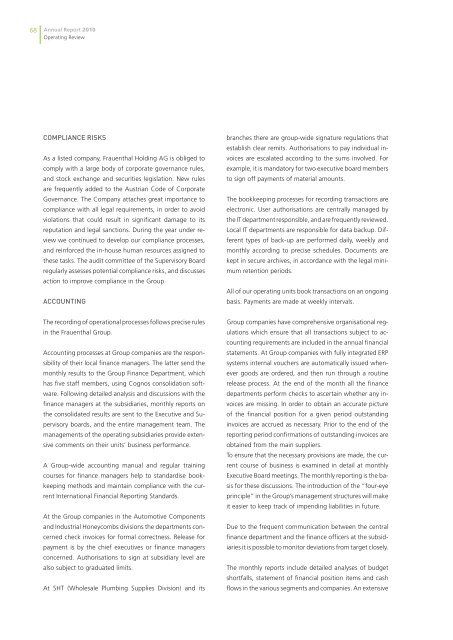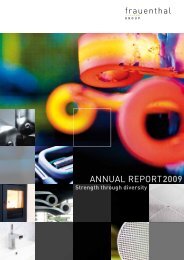Annual Report 2010 - Frauenthal Holding AG
Annual Report 2010 - Frauenthal Holding AG
Annual Report 2010 - Frauenthal Holding AG
You also want an ePaper? Increase the reach of your titles
YUMPU automatically turns print PDFs into web optimized ePapers that Google loves.
68 <strong>Annual</strong> <strong>Report</strong> <strong>2010</strong><br />
Operating Review<br />
CoMPlianCe riSkS<br />
As a listed company, <strong>Frauenthal</strong> <strong>Holding</strong> <strong>AG</strong> is obliged to<br />
comply with a large body of corporate governance rules,<br />
and stock exchange and securities legislation. New rules<br />
are frequently added to the Austrian Code of Corporate<br />
Governance. The Company attaches great importance to<br />
compliance with all legal requirements, in order to avoid<br />
violations that could result in significant damage to its<br />
reputation and legal sanctions. During the year under review<br />
we continued to develop our compliance processes,<br />
and reinforced the in-house human resources assigned to<br />
these tasks. The audit committee of the Supervisory Board<br />
regularly assesses potential compliance risks, and discusses<br />
action to improve compliance in the Group.<br />
aCCounting<br />
The recording of operational processes follows precise rules<br />
in the <strong>Frauenthal</strong> Group.<br />
Accounting processes at Group companies are the responsibility<br />
of their local finance managers. The latter send the<br />
monthly results to the Group Finance Department, which<br />
has five staff members, using Cognos consolidation software.<br />
Following detailed analysis and discussions with the<br />
finance managers at the subsidiaries, monthly reports on<br />
the consolidated results are sent to the Executive and Supervisory<br />
boards, and the entire management team. The<br />
managements of the operating subsidiaries provide extensive<br />
comments on their units’ business performance.<br />
A Group-wide accounting manual and regular training<br />
courses for finance managers help to standardise bookkeeping<br />
methods and maintain compliance with the current<br />
International Financial <strong>Report</strong>ing Standards.<br />
At the Group companies in the Automotive Components<br />
and Industrial Honeycombs divisions the departments concerned<br />
check invoices for formal correctness. Release for<br />
payment is by the chief executives or finance managers<br />
concerned. Authorisations to sign at subsidiary level are<br />
also subject to graduated limits.<br />
At SHT (Wholesale Plumbing Supplies Division) and its<br />
branches there are group-wide signature regulations that<br />
establish clear remits. Authorisations to pay individual invoices<br />
are escalated according to the sums involved. For<br />
example, it is mandatory for two executive board members<br />
to sign off payments of material amounts.<br />
The bookkeeping processes for recording transactions are<br />
electronic. User authorisations are centrally managed by<br />
the IT department responsible, and are frequently reviewed.<br />
Local IT departments are responsible for data backup. Different<br />
types of back-up are performed daily, weekly and<br />
monthly according to precise schedules. Documents are<br />
kept in secure archives, in accordance with the legal minimum<br />
retention periods.<br />
All of our operating units book transactions on an ongoing<br />
basis. Payments are made at weekly intervals.<br />
Group companies have comprehensive organisational regulations<br />
which ensure that all transactions subject to accounting<br />
requirements are included in the annual financial<br />
statements. At Group companies with fully integrated ERP<br />
systems internal vouchers are automatically issued whenever<br />
goods are ordered, and then run through a routine<br />
release process. At the end of the month all the finance<br />
departments perform checks to ascertain whether any invoices<br />
are missing. In order to obtain an accurate picture<br />
of the financial position for a given period outstanding<br />
invoices are accrued as necessary. Prior to the end of the<br />
reporting period confirmations of outstanding invoices are<br />
obtained from the main suppliers.<br />
To ensure that the necessary provisions are made, the current<br />
course of business is examined in detail at monthly<br />
Executive Board meetings. The monthly reporting is the basis<br />
for these discussions. The introduction of the “four-eye<br />
principle” in the Group’s management structures will make<br />
it easier to keep track of impending liabilities in future.<br />
Due to the frequent communication between the central<br />
finance department and the finance officers at the subsidiaries<br />
it is possible to monitor deviations from target closely.<br />
The monthly reports include detailed analyses of budget<br />
shortfalls, statement of financial position items and cash<br />
flows in the various segments and companies. An extensive




